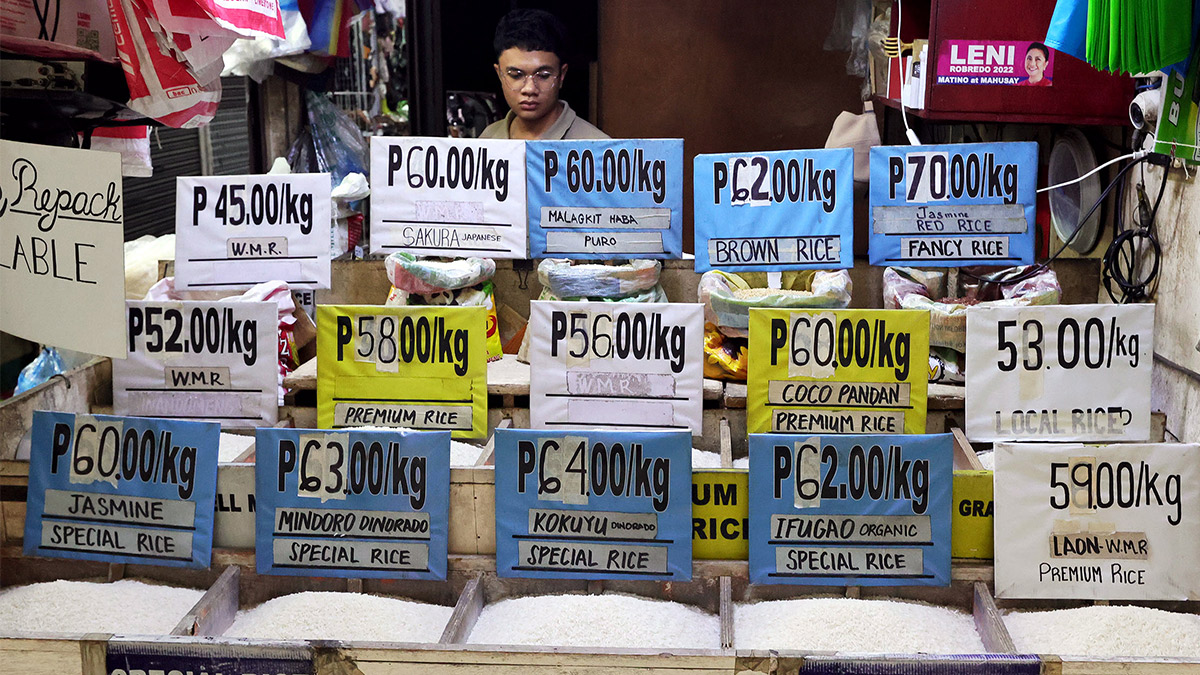Tweaks in rice tariffication law urgent, says Marcos

PRICE WATCH Rice prices in this stall at the Marikina City public market on Feb. 15 range from P45 a kilo, the cheapest variety of well-milled rice, to P70 a kilo for the “fancy” red rice. Keeping food, especially rice, affordable to ordinary wage earners is among the major challenges faced by the Marcos administration. GRIG C. MONTEGRANDE
MANILA, Philippines — President Ferdinand Marcos Jr. on Monday said he would certify as urgent the proposed amendments to the Rice Tariffication Law (RTL), in a bid to lower stubbornly high prices of rice that have stoked inflation and weakened Filipinos’ purchasing power.
“[The proposal to amend Republic Act No. 11203] is something that has come up [because] of the problem that the prices of rice go up because traders compete, bidding for a higher buying price of palay and we do not have control over that,” the President said on the sidelines of the 2024 GOCCs (Government-Owned and -Controlled Corporations) Day at the Philippine International Convention Center in Pasay City on Monday.
The proposed amendment to the RTL, calling specifically for the National Food Authority (NFA) to get involved in the buying and selling of palay to balance out market forces, “justifies an urgent certification,” he said.
READS: Farmers’ group decries rice tariffication law, claims P44B lost
“If we can introduce amendments to the NFA charter in the (RTL), this will allow us [in government] to control and influence the pricing of rice,” he said, “So, that’s what we are going to do.”
Article continues after this advertisementMarcos had said during his campaign and early in his term that his administration would bring down rice prices to as low as P20 a kilo.
Article continues after this advertisementBut as of May 3, local regular milled rice was sold at P50 a kilo, up from P34 to P42 a kilo during the same period last year. Imported regular milled rice, on the other hand, is going for P48 to P51 a kilo, up from P37 to P38 a kilo last year, based on data from the Department of Agriculture (DA).

Importation
Enacted in 2019, the RTL provided for the unlimited entry of imported rice subject to tariffs, which are then plowed back into the Rice Competitiveness Enhancement Fund (RCEF) to help local farmers become more competitive in rice production.
However, the NFA had also been barred from buying and selling rice, and its role was limited to managing buffer rice stocks.
Speaker Martin Romualdez has been pushing for the RTL amendment to allow the NFA to sell rice, noting that rice prices could go down by P10 to P15, or close to the P30 per kilo mark, if the RTL is amended and the NFA is allowed to “influence” the selling and buying prices of rice in the local market.
In a statement, Romualdez said that revisiting the RTL showed the government’s commitment to reducing market prices of rice and protecting farmers and consumers from unscrupulous traders and profiteers.
“The certification of this bill as urgent by President Marcos is a critical step forward in our concerted efforts to improve the livelihood of our local farmers and ensure food security for all Filipinos,” he said.
“By adjusting the framework for rice importation and enhancing the role of the NFA in the market, we can better protect our rice prices from the volatility caused by international markets and the predatory practices of some traders,” Romualdez explained, pointing out that, “This will lead to more stable and predictable pricing for consumers while ensuring farmers receive a fair price for their produce.”
‘Flawed’
In a television interview, former Agriculture Secretary Emmanuel Piñol lauded the President’s pronouncement that he would certify proposed amendments to the RTL as an urgent measure, which he described as a “flawed [piece of] legislation.”
“…The RTL actually was a legislation that was crafted without consultation through the stakeholders of the rice industry,” Piñol said over the government television program “Bagong Pilipinas Ngayon.”
He lamented how the RTL supposedly stripped the government of its powers to regulate the rice industry, purportedly allowing full control over the stocks and pricing of rice in the market by the “rice cartel or rice mafia.”
The DA also supported moves to restore the NFA’s function as a rice price stabilizer and increase the fund allocation for programs to enhance rice production and farmers’ incomes as lawmakers deliberated on measures seeking to extend the RTL.
In his report to the House committee on agriculture chaired by Quezon Rep. Wilfrido Mark Enverga, Agriculture Secretary Francisco Tiu Laurel Jr. lauded the RTL as a landmark legislation that provided “the platform and infrastructure to increase the productivity and incomes of farmers even as competition arising from freer importation stands to benefit consumers.”
He said the major amendments to the RTL that the DA was proposing include:
- Strengthening the role of NFA as price stabilizer by restoring its ability to import if needed to boost domestic supply and only through the authority of the DA secretary; its warehouse registration and monitoring functions; and its power to regulate rice prices and market supply.
- Extension of the RCEF until 2030, including reallocation of funds toward farm machinery and postharvest facilities, as well as storage and processing; seed development; and training and extension services, with special attention to soil health improvement initiatives and pest and disease management strategies to protect and enhance rice production.